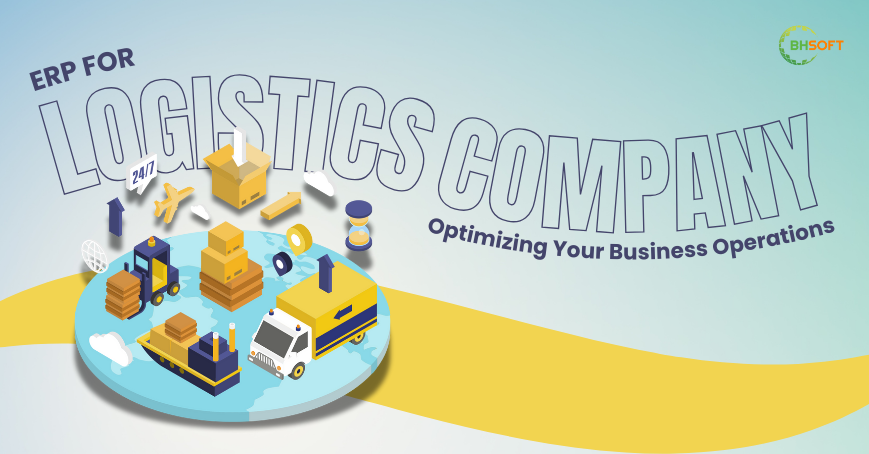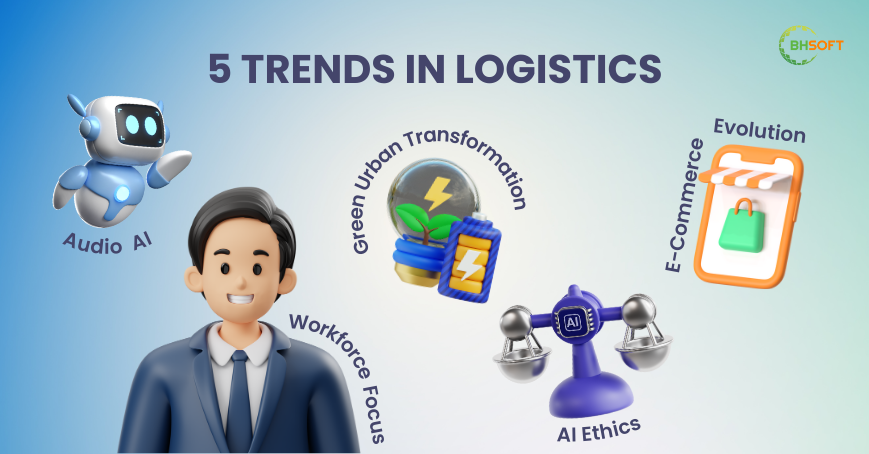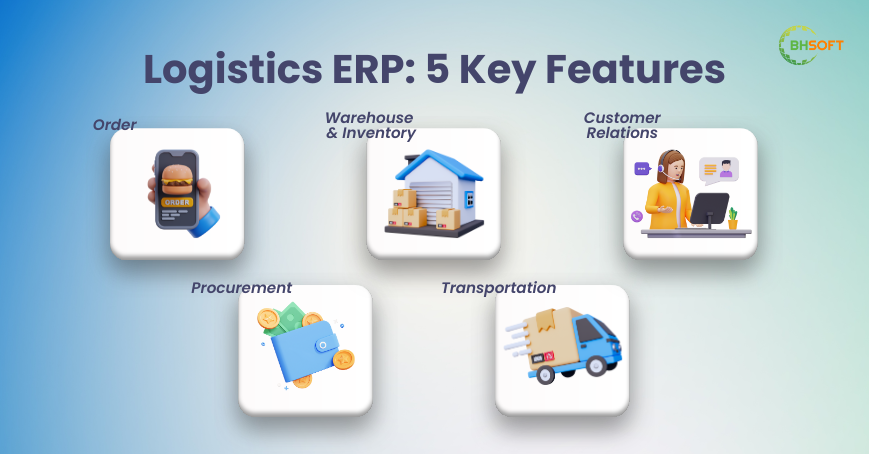Home > Insight > IT Business
ERP for Logistics Company: Optimizing Your Business Operations
Did you know that poor inventory tracking can cost logistics businesses millions annually? According to Supply Chain Dive, over 62% of logistics businesses suffer from financial performance issues due to poor inventory tracking systems. Lack of visibility and accuracy in logistics management has become a major obstacle. An efficient management system is no longer optional but a must-have for businesses.
ERP for Logistics Company offers a powerful tool to improve inventory accuracy, enhance supply chain transparency and protect businesses from costly errors. This blog will explore the fascinating facts about ERP software for Logistics firms and reveal 1 of the most trusted tools in the industry.

1. What is ERP for Logistics Company?
ERP, short for Enterprise Resource Planning, is a type of software that integrates various business processes across an organization. Think of it as a central hub that connects different departments like finance, human resources, logistics, productios, sales, etc. ERP allows for seamless data flow and improved decision-making.
While a general ERP system can be used by any business, ERP for Logistics Company is specifically customized to address the unique needs and challenges of the industry. It incorporates specialized modules such as transportation management, warehouse management, supply chain management,...ERP for Logistics enables businesses to optimize operations and gain a competitive edge in the dynamic market.
2. Trends in Logistics and the role of ERP
DHL is a big global logistics company that offers a range of services (shipping, supply chain management, E-commerce logistics, freight transport, warehousing, packaging, etc.). In Logistics Trend Radar 7.0, key player in the logistics industry has identified several emerging trends in the logistics industry with an adoption timescale of five years or less. They are audio AI, green urban transformation, e-commerce evolution, workforce focus and AI ethics.

a) Audio AI
Audio AI uses voice recognition and natural language processing to simplify operations and improve efficiency. In logistics, this technology is becoming popular for tasks like voice-activated warehouse workflows, driver communication, and automated customer service.
Logistics ERP can connect with voice-controlled devices, enabling warehouse staff to pick, pack, and update inventory hands-free, which boosts speed and accuracy. ERP platforms also use audio AI to improve communication with drivers and customers, offering real-time shipment updates through voice systems. By combining ERP and audio AI, logistics companies can deliver faster, voice-driven support to enhance customer experiences and solve queries efficiently.
b) Green Urban Transformation
Green urban transformation emphasizes sustainable logistics in cities, promoting eco-friendly transportation, optimized delivery routes, and reduced emissions.
Logistics ERP analyzes traffic patterns to recommend fuel-saving routes, helping reduce carbon footprints. It tracks vehicle performance to manage fuel use and supports the shift to eco-friendly fleets. ERP tools also improve inventory planning, minimizing unnecessary trips and further cutting emissions, making urban logistics more sustainable and efficient.
c) E-Commerce Evolution
The rapid growth of e-commerce has transformed customer expectations, with a focus on faster deliveries, real-time tracking, and seamless returns.
Logistics ERP offers full order visibility, enabling customers to track shipments in real-time. It simplifies returns by automating approvals, creating shipping labels, and updating inventory seamlessly. With ERP integration, logistics companies can scale efficiently to handle increasing e-commerce demands while maintaining high performance and customer satisfaction.
d) Workforce Focus
The workforce focus trend highlights the importance of employee well-being, skill development and technology adoption to boost productivity in logistics.
Logistics ERP minimizes manual tasks by automating repetitive processes, freeing employees to focus on more valuable work. It integrates with learning management systems to deliver training modules and performance insights, supporting skill growth. ERP tools also optimize workforce scheduling, balancing workloads to enhance efficiency and prevent burnout.
e) AI Ethics
AI ethics in logistics focuses on maintaining fairness, transparency, and accountability in AI-driven processes like routing, customer profiling, and decision-making.
Logistics ERP with integrated AI delivers clear, data-driven insights that can be audited for fairness and compliance. It ensures secure and ethical handling of customer data, aligning with industry standards. By using diverse datasets and automated processes, ERP tools help minimize biases in decisions, such as carrier selection and route optimization, promoting more equitable and effective operations.
Embracing these trends with modern ERP systems can enhance operational efficiency, improve customer satisfaction and achieve sustainable growth in the years to come. Along with other existing Social, Business and Technology trends, operational software in Logistics Businesses must be agile and adaptable to stay competitive. To better understand how ERP drives efficiency and growth, we will now explore the key modules and their applications in a logistics company.
3. How does ERP work in a Logistics Company: 5 Key Features
Before being applied to adapt to potential future trends in the logistics industry, ERP systems effectively fulfilled their roles in the core areas of a logistics enterprise. Logistics businesses may have different areas in their internal operations but there are 5 important key features. Let's see the common challenges faced in each function and how ERP for Logistics Company can be applied to automate, optimize and improve efficiency.

3.1. Order Management
Common Challenges
- Tracking order progress from entry to delivery is cumbersome, leading to delays in customer updates.
- Manual order entry and processing often result in errors, slowing down the fulfillment process.
- Limited integration with inventory systems causes mismatched stock levels and delayed shipments.
- Customers expect real-time updates on their orders, but traditional systems fail to deliver this transparency.
How Logistics ERP Helps
- Real-time tracking enables businesses to monitor the order fulfillment process from start to finish, providing timely updates to customers.
- Automation simplifies order entry and processing, reducing errors and speeding up turnaround times.
- Customer notifications automate order status updates, keeping customers informed at every stage.
- Seamless integration connects order management with inventory systems to facilitate prompt and accurate fulfillment.
Example:
Logistics ERP can automatically notify customers when their order is picked, packed, shipped, or delivered, ensuring a transparent and reliable experience.
3.2. Procurement Management
Common Challenges
- Inefficient supplier relationships lead to delays in procurement and increased costs.
- Manual purchase orders slow down the approval process, affecting timely delivery.
- Tracking contract compliance and managing procurement risks is labor-intensive.
- Budget overruns occur due to a lack of data-driven purchasing decisions.
How Logistics ERP Helps
- Centralized supplier management stores all supplier information in one place, enabling better relationship management and negotiation.
- Automated purchase orders simplify the approval process and speed up ordering, ensuring timely procurement.
- Contract compliance monitoring tracks contracts and ensures adherence to agreed terms, reducing risks.
- Procurement analytics provides insights into purchasing trends, helping optimize budgets and identify cost-saving opportunities.
Example:
With ERP for Logistics, businesses can automate reordering processes based on stock levels and supplier lead times, ensuring materials are always available when needed.
3.3. Warehouse and Inventory Management
Common Challenges
- Difficulty in tracking inventory levels and locations leads to stockouts or overstocking.
- Inefficient warehouse layouts result in wasted space and slower order fulfillment.
- High error rates in picking and packing processes disrupt timely deliveries.
- Delayed responses to low-stock situations cause interruptions in operations.
How Logistics ERP Helps
- Real-time updates track inventory levels and locations with precision, ensuring accurate stock visibility.
- Optimized workflows improve picking and packing accuracy with efficient workflows and integrated technologies like barcode scanners.
- Low-stock alerts generate automated alerts for restocking, reducing the risk of stockouts.
- Space utilization designs smart layouts to maximize warehouse space and improve operational efficiency.
Example:
A Logistics ERP software can suggest optimal storage locations for frequently picked items, minimizing travel time within the warehouse and boosting productivity.
3.4. Transportation Management
Common Challenges
- Inefficient route planning increases travel time and fuel costs.
- Choosing unreliable carriers affects delivery timelines and customer satisfaction.
- Limited visibility into shipment status makes it hard to manage delays effectively.
- Disruptions in transportation networks are often identified too late, leading to costly delays.
How Logistics ERP Helps
- Route optimization plans efficient routes to minimize travel time and reduce fuel consumption.
- Carrier management selects carriers based on performance metrics like reliability and cost-effectiveness.
- Real-time tracking monitors shipments throughout their journey, providing visibility to both businesses and customers.
- Disruption alerts send instant notifications about delays or issues, allowing quick resolution.
Example:
ERP for Logistics can suggest alternative routes in case of traffic or weather disruptions, ensuring timely deliveries.
3.5. Customer Relationship Management (CRM)
Common Challenges
- Tracking customer interactions and preferences across different channels is fragmented and inefficient.
- Lack of insight into customer behavior leads to missed opportunities for personalization.
- Sales pipelines are difficult to manage, causing delays in closing deals.
- Marketing efforts are not aligned with customer needs, reducing campaign effectiveness.
How Logistics ERP Helps
- Centralized customer data stores interaction history in one place, making it easier to manage relationships and respond to inquiries.
- Sales pipeline management tracks opportunities and streamlines the sales process, ensuring better conversion rates.
- Behavior analysis analyzes customer behavior to tailor services and offerings for improved satisfaction.
- Marketing collaboration integrates with marketing tools to create targeted outreach campaigns based on customer preferences.
Example:
ERP for Logistics businesses can track frequent customer purchases and send personalized offers, increasing loyalty and repeat business.
4. Enhance efficiency with Odoo - a smart option for Logistics Businesses
4.1. What is Odoo ERP for Logistics Company?
Odoo is an open-source, all-in-one business management software designed to help businesses streamline their operations. Its modular structure offers a wide range of integrated applications, including CRM, inventory management, accounting, sales, and more. With its flexibility and scalability, Odoo can be tailored to meet the unique needs of any business.
For logistics companies, Odoo ERP provides an industry-specific solution that addresses key challenges. As a comprehensive ERP for logistics company, it integrates essential functions like order tracking, inventory control, warehouse management, etc.
4.2. Why should a Logistics Company choose Odoo ERP?
Choosing the right ERP for Logistics Company is a crucial solution for success. Odoo stands out as an excellent choice for several compelling reasons:
Firstly, Odoo offers a comprehensive logistics functionality, which makes the whole process of an organization run in sync and be controlled efficiently.
Moreover, Odoo's open-source nature and modular structure allow for customization and flexibility to meet the unique needs of each logistics business. You can easily add or remove modules as your business grows and evolves.
As an open-source solution, Odoo offers a more cost-effective alternative to traditional, expensive ERP systems.
Furthermore, Odoo can easily scale to accommodate the growth of your business, from small startups to large enterprises.
Lastly, Odoo seamlessly integrates with various third-party applications, such as shipping carriers, payment gateways, and other logistics-related tools.
You can explore the latest features that support Logistics operations here.
4.3. How BHSoft supports your logistics business with Odoo Customization Solutions
BHSoft specializes in Odoo Customization Solutions, helping logistics companies streamline operations and drive growth. We offer a comprehensive suite of services designed to meet your specific needs:
Logistics Odoo Customization
Our experienced Odoo developers can tailor Odoo's features to perfectly match the unique workflows and processes of your logistics business. We can extend functionalities to enhance areas like order management, inventory control, warehouse operations, and transportation management. This ensures that your Odoo system seamlessly integrates with your existing operations and provides a user-friendly experience for your staff.
Logistics Odoo Consultancy
Our Odoo consultants specialize in logistics operations and Odoo functionalities. We provide strategic guidance to optimize processes, identify automation opportunities and ensure successful implementation. By understanding your specific challenges and goals, we develop a customized Odoo solution that delivers measurable results.
Logistics Odoo Support & Maintenance
BHSoft provides ongoing support and maintenance to keep your Odoo system running smoothly after implementation. Our team handles updates, bug fixes, and performance optimizations to ensure your system stays secure and up-to-date. We also offer training and support to help your staff fully utilize Odoo's capabilities.
Conclusion
To sum up, in the face of emerging trends and ongoing challenges within the logistics industry, ERP solutions have proven to be a transformative force. They empower businesses to operate more efficiently, cost-effectively, and securely—while staying adaptable to innovation and maintaining long-term sustainability. Implementing an ERP system for logistics operations is no longer just an option but a necessity for businesses aiming for greater confidence and resilience.
As a trusted software development company in Vietnam, BHSoft understands the importance of providing solutions tailored to each client’s unique needs. That’s why our Odoo Customization Solutions are designed to help logistics companies simplify operations, save time, and accelerate growth.
If you’re looking for a reliable partner to help you unlock the full potential of ERP for your logistics business, BHSoft is ready to support you every step of the way. Let’s work together to make your logistics operations seamless and future-ready.


